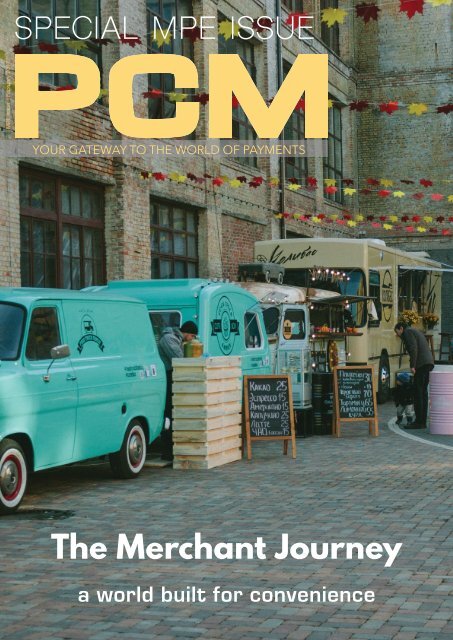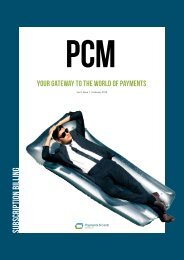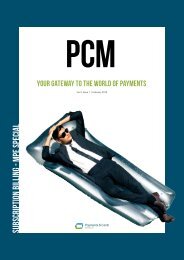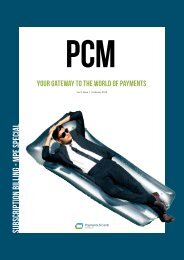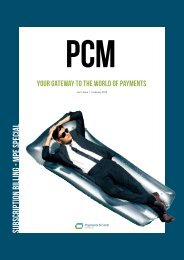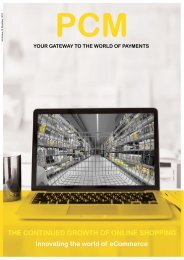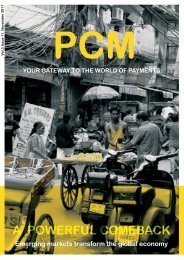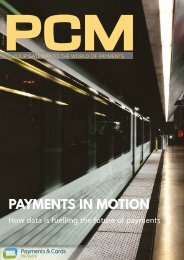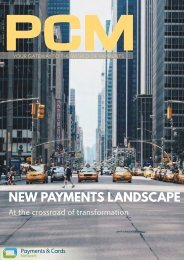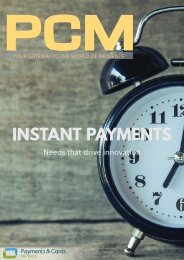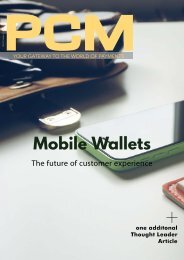PCM MPE 2017 Special
This is a special issue created for the Merchant Payments Ecosystem event in Berlin 2017. This special issue focuses on various topic in the Payments & FinTech industry ranging from Loyalty to Emerging Markets and Risk & Fraud
This is a special issue created for the Merchant Payments Ecosystem event in Berlin 2017. This special issue focuses on various topic in the Payments & FinTech industry ranging from Loyalty to Emerging Markets and Risk & Fraud
You also want an ePaper? Increase the reach of your titles
YUMPU automatically turns print PDFs into web optimized ePapers that Google loves.
<strong>MPE</strong> Issue | February <strong>2017</strong><br />
SPECIAL <strong>MPE</strong> ISSUE<br />
<strong>PCM</strong><br />
YOUR GATEWAY TO THE WORLD OF PAYMENTS<br />
The Merchant Journey<br />
a world built for convenience
10TH<br />
ANNIVERSARY<br />
February 14-16, <strong>2017</strong> Berlin<br />
1000+<br />
attendees at TOP European conference & exhibition<br />
CARD ACQUIRING, CX, POS, REGULATION,<br />
SECURITY, ONLINE & MOBILE PAYMENTS<br />
300+<br />
<strong>MPE</strong> C-Level Club executives<br />
150+<br />
amazing speakers<br />
Ingenico ePayments, Payvision, Verifone, Worldline,<br />
Equens, PPRO Group, Wirecard, Worldpay, Sagepay,<br />
Concardis, Holland FinTech, Spire Payments, SumUp,<br />
iZettle, Wargaming.net, Samsung Pay, UBER,<br />
Carrefour, AliPay<br />
... and many more<br />
Yandex.Money<br />
iDEAL<br />
SEPA Express<br />
MyBank<br />
Mastercard<br />
70+<br />
SPONSORS & EXHIBITORS<br />
<strong>MPE</strong> Awards<br />
& Gala Dinner<br />
<strong>MPE</strong> Awards acknowledge<br />
13 leading vendors, influential<br />
leaders & rising stars<br />
payment gateway services<br />
www.merchantpaymentsecosystem.com<br />
+421 233 329 999 mpe@empiriagroup.eu
Contents<br />
Amir Abdin<br />
Editor-in-Chief<br />
amir@paymentsandcardsnetwork.com<br />
https://nl.linkedin.com/in/amir-abdin-21365683<br />
STORIES<br />
4<br />
The Payments Powerhouse between<br />
Europe and Asia<br />
8<br />
Wallet Wars - The Awakening<br />
Duc Dang<br />
Production Editor<br />
duc@paymentsandcardsnetwork.com<br />
https://nl.linkedin.com/in/ducdanghh<br />
11<br />
15<br />
20<br />
Open API driven innovations as<br />
differentiators<br />
Customer Loyalty: The Comeback Story<br />
Start-up Spotlight: Yoyo Wallet<br />
THANKS TO OUR PARTNERS<br />
Layla Durani<br />
Editor<br />
layla@paymentsandcardsnetwork.com<br />
https://nl.linkedin.com/in/layladurrani<br />
<strong>PCM</strong> is designed by Duc Dang, Payments & Cards Network. Art<br />
and photos © Payments & Cards Network, picjumbo.com and<br />
Shutterstock.com, excluding advertisments and company logos.<br />
<strong>PCM</strong> is property of Payments & Cards Network, Herengracht 576,<br />
2nd Fl., 1017 CJ, Amsterdam, The Netherlands. All material contained<br />
within <strong>PCM</strong> is the property of Payments & Cards Network. All other<br />
product and service names may be trademarks of their respective<br />
companies. ©<strong>2017</strong> Payments & Cards Network. All rights reserved.<br />
Reproduction of any kind is strictly prohibited without express prior<br />
written consent of Payments & Cards Network.<br />
ADVERTISING INFORMATION<br />
For details, please contact amir@paymentsandcardsnetwork.com<br />
3
Thought Leaders Corner<br />
TURKEY<br />
The Payments Powerhouse<br />
between Europe and Asia<br />
by Y. Emre Güzer<br />
Between 2012 and 2016, more than 40 million dollars<br />
were invested only in FinTech initiatives in Turkey. This<br />
enabled the country to grow by 20 per cent annually in<br />
the field of financial technology. In particular, recent<br />
developments of new solutions in payments systems boosted<br />
the significant growth of investment in the payments domain.<br />
The <strong>PCM</strong> team invited Y. Emre Güzer, Country director of PayU<br />
Turkey, to share his experience operating in the Turkish market<br />
as well as critical challenges businesses need to consider when<br />
entering the market.<br />
As head of Turkey can you can give us a summary of what<br />
the payment landscape looks like in Turkey?<br />
The Turkish market is more developed compared to<br />
European markets in terms of payment systems and payment<br />
infrastructure.In addition, the country has a solid banking<br />
system and the technology to back it up. We can easily say<br />
that Turkey is a credit card driven country with more than 58<br />
million credit cards in the country. Although there are more<br />
than 115 million debit cards in Turkey, debit card usage rates<br />
in online & offline shopping are very low.<br />
The main reason for high credit card usage is installment<br />
options and many people prefer installment options even for<br />
purchases of more than TRY50 (online & offline). Electronics,<br />
fashion and jewelry are top sectors in terms of installment<br />
usage rates. The most preferred installment period is 3 or<br />
4 months. Several banks provide loyalty programs with<br />
installment options.<br />
As a merchant you have to work with a few banks to offer<br />
shopping through card points (loyalty) or installments in<br />
order to cover a large consumer base. Therefore we at PayU in<br />
Turkey work with 6 banks to give our merchants the highest<br />
conversions and an ability to appeal to more consumers.<br />
The Turkish payment ecosystem is built on several layers<br />
of payment companies, associations, banks and regulators.<br />
Working together is crucial.<br />
If you’re a payment company, one of your main targets is<br />
offering several payment methods to your merchants to<br />
allow them get many consumers and increase their sales.<br />
Therefore we have several business partners in Turkey. One<br />
of them is BKM (Interbank Card Center). The Interbank Card<br />
4
Thought Leaders Corner<br />
Center (BKM) was established in 1990 with the partnership<br />
of 13 public and private Turkish banks with the purpose of<br />
providing solutions to common problems and developing the<br />
rules and standards of credit and debit cards in Turkey, within<br />
the card payment system. They developed BKM Express,<br />
a national digital wallet, which is one of the milestones in<br />
Turkish e-commerce history. It has been used by 2 million<br />
unique cardholders from 17 banks.<br />
We also recently integrated our system with ComPay, which<br />
works similarly to PayByLink and allows direct money transfer<br />
from banks for more than 5,5 million consumers. Direct Debit<br />
plays a critical role in the market for consumers with security<br />
& trust issues who do not want to use their credit card.<br />
For our merchants we are trying to expand the e-commerce<br />
ecosystem and leverage the market. That’s why we are seeking<br />
solutions to enable online payment options for unbanked &<br />
underbanked consumers. Even as credit card usage is high<br />
it shouldn’t be forgotten that almost 50% of the Turkish<br />
population does not have access to banking services.<br />
Recently we made a deal with UPT (universal payment transfer<br />
company) and integrated our payment infrastructure with post<br />
offices’ from all around Turkey to reach 25 million unbanked<br />
adults. We are aware of our responsibilities and are working<br />
to attract new users to the ecosystem and grow the payment<br />
system industry.<br />
Given everything that has happened in Turkey, what in the<br />
way of innovation and business opportunity can global<br />
merchants expect from your market?<br />
Turkey is the 18th largest economy in the world and 6th largest<br />
economy compared with the EU. Main assets include a young,<br />
dynamic population, a large domestic market, and a strategic<br />
location, combined with strong infrastructure and much<br />
improved public services.<br />
Social & technological factors show us that the country has<br />
big potential when it comes to adaption of new technologies &<br />
online / social media usage which will lead to an e-commerce<br />
boom in the near future.<br />
• 48.6 million broadband internet subscribers in 2015, up<br />
from 0.1 million in 2002 (ICTA, TurkStat)<br />
• 73.6 million mobile phone subscribers in 2015, up from<br />
23 million in 2002 (TurkStat)<br />
• 58 million credit card users in 2015, up from 16 million in<br />
2002 (The Interbank Card Center of Turkey)<br />
• 181 million airline passengers in 2015, up from 33 million<br />
in 2002 (TurkStat)<br />
• 35.6 million international tourist arrivals in 2015, up from<br />
13 million in 2002 (TurkStat)<br />
And recently the Turkish government introduced a new law<br />
that offers citizenship for foreigners who invest, acquire real<br />
estate, or place deposit in banks.<br />
And news is coming in from important companies worldwide<br />
like Bank of China – The world’s 7th largest & China’s 3rd<br />
Y. Emre Güzer<br />
Country Director - PayU Turkey<br />
Y. Emre Güzer started his professional career at<br />
Pamukbank in 2001. He was Electronic Commerce<br />
Products Director at Garanti Payment Systems,<br />
where he played active roles in the establishment<br />
of many payment and verification systems that are<br />
used throughout Turkey. He has published research<br />
articles in various academic resources that focus on<br />
the online world and the ecommerce sector. As of<br />
2011, Y. Emre Güzer was appointed as the Country<br />
Director of PayU Turkey.<br />
largest.They set up deposit banking in Turkey, bringing in<br />
required capital. The country’s Banking Regulation and<br />
Supervision Agency (BDDK) said BOC had brought the “required<br />
capital” and would begin operating shortly. And recently U.S.-<br />
based multinational alternative investment company National<br />
Standard Finance (NSF) made an announcement that they will<br />
connect Turkey with a $2 trillion funding network that would<br />
bring direct foreign investment and help boost the economy.<br />
What do you see as the most important factors for global<br />
merchants to be aware of when entering your market?<br />
Credit card and installment are the keys to enter the Turkish<br />
market. I can say that international merchants are lucky<br />
because credit card transaction is a universal payment method<br />
and makes payment processes easier for businesses. But there<br />
is an additional hussle if they’re processing from abroad<br />
because they won’t able to offer an installment option.<br />
Without having a Turkish entity, international merchants can<br />
5
Thought Leaders Corner<br />
easily benefit from PayU Turkey’s services & local payment<br />
methods like point redemption during shopping, installment<br />
etc.<br />
The importance of value added services like fraud, 1click,<br />
and recurring payments should be taken into consideration<br />
too because they play an important role in increasing sales,<br />
conversion rates and revenue.<br />
PayU offers several payment services, customized to Turkish<br />
consumer needs that will help every kind of merchant to<br />
increase their sales. In addition to payment & value added<br />
services we offer our merchants the opportunity to run endconsumer<br />
campaigns with BKM Express for 2m wallet users<br />
and Compay for 5.5m consumers. Needless to say that having<br />
local PSPs also increases conversion Rates from 45% for token<br />
payments to 82% as credit cards and terminals are from Turkey<br />
and we have direct integration with the acquirers. We saw that<br />
CRs for our international merchants was 45% for users who<br />
received payments from Turkey with tokens. We increased the<br />
CRs of GIMs to 80%, by enabling them to integrate directly with<br />
the acquirers in Turkey.<br />
And in future the share of alternative payment methods will<br />
increase (PaybyLink – BKM Express etc) therefore international<br />
merchants should offer local payment methods to be sure that<br />
they’re covering their largest consumer base.<br />
Apart from credit card payments (with a share of 85% in<br />
market) Turkish consumers need new ways for online payments<br />
because credit cards are not enough to cover all. We foresee<br />
that the share of credit cards will decrease to 60% in 5 years in<br />
light of the new technical developments and changing payment<br />
culture enabling more and more consumers to shop online.<br />
Any last bits of advise for a company contemplating<br />
expanding into this exciting market?<br />
Turkey is a country between East and West which means that<br />
you may be a global company, but you have to act locally to be<br />
successful here. Companies that don’t understand the power<br />
of localisation are forced to leave the country eventually<br />
because they couldn’t understand consumer needs. Therefore<br />
international companies should work with powerful local<br />
partners in order to understand market needs & dynamics.<br />
When it comes to payment systems, processing locally allows<br />
global companies to have better control over the conditions of<br />
the Turkish market & consumer.<br />
• 60% of all ecommerce transactions are made using<br />
installments from credit cards issuers.<br />
• 6 different connections to Banks are required in order to<br />
offer installments with all major Banks and give access<br />
to the loyalty programs<br />
• Plus 1-click payment, recurring payment, BKM Express<br />
(national digital wallet) and PyByLink and CashPay<br />
options are offered to the merchants with several<br />
campaign opportunites<br />
PayU<br />
PayU is a leading online payment service in 16 high growth markets across Africa and the Middle<br />
East, Central and Eastern Europe, India and Latin America. Our 250+ payment options enable safe<br />
transactions for more than 160,000 merchants, allowing them to focus on reaching the 2.3 billion<br />
consumers in our markets.<br />
For more information please visit www.payu.com<br />
6
Thought Leaders Corner<br />
“Wallet Wars” - The Awakening<br />
Consumer awareness of mobile payment has risen dramatically but<br />
adoption rates aren’t as high as many research institutions predicted.<br />
At this stage of mobile-first it is now time to move forward with valueadded<br />
services on an aggregated level to make mobile payment SEXY<br />
and CONVENIENT.<br />
by Martin Christl<br />
The current view on the mobile payment ecosystem<br />
Experts identified main challenges for the mobile<br />
payments landscape:<br />
1. Mobile payment is not a seamless and consistent<br />
experience.<br />
2. The Pan-European Consortia which aimed to unify the<br />
market, failed in its attempts due to a lack of collaboration<br />
and strategic alignment cross borders.<br />
3. Payment schemes are looking for alternative revenue<br />
streams to compensate for their regulated transaction<br />
rates and to compete with fintechs entering the market.<br />
4. PSD2 (European payment industry regulation) puts<br />
pressure on the whole payment market as providers have<br />
to open up their environments to standardised conditions.<br />
5. Most of the mobile payment services don’t offer sufficient<br />
special incentives.<br />
8
Thought Leaders Corner<br />
How to survive the “Wallet Wars”?<br />
Consumer centric user experience is the basic groundwork of<br />
the only useful but daunting KPI: Retention Rate. Merchants<br />
and brands seek deeper and stronger relationships with<br />
consumers to enable cross-selling and to up-sell their<br />
portfolio. Meanwhile a <strong>2017</strong> consumer expects consistent<br />
experience across all sales channels and touchpoints from the<br />
brands they love.<br />
Mobile wallets will play a key role in connecting brands and<br />
consumers and enabling a seamless shopping experience.<br />
People today have clearly expressed their desire for a single<br />
wallet that keeps track of all of their loyalty memberships and<br />
coupons, and automatically applies earned rewards.<br />
A well designed wallet is meant to:<br />
1. enable a compelling mobile shopping customer<br />
experience<br />
2. help merchants attract new customer and serve loyal preexisting<br />
customers<br />
3. generate the necessary scale across the whole value chain.<br />
Considering the increasing adoption of mobile wallets such<br />
as ApplePay, AndroidPay, SamsungPay, and AliPay - how will<br />
other players compete with the growing number of global<br />
over-the-top services?<br />
The roadblock of mobile wallets<br />
The lure of something new has universal appeal. Therefore,<br />
it’s no surprise that mobile wallet providers spend a lot of<br />
resources to attract new consumers. But even for big brands,<br />
acceptance is growing slowly, mainly due to the diversity of<br />
offerings. Low merchant acceptance rates result in consumer<br />
mistrust. Mobile wallets don´t come with a lot of consumer<br />
friendly features in general, beyond the initial cool factor or<br />
the ability to save time at the till. If it’s urgent that consumers<br />
adapt their behaviour, you must come up with a game changing<br />
relevant experience.<br />
Sweet spot for merchant services<br />
Loyalty programmes and couponing are at the heart of many<br />
merchants’ customer engagement strategies.<br />
Advanced mobile technologies and services are opening up<br />
opportunities to make loyalty and couponing more relevant<br />
and compelling for consumers.<br />
In-store, merchants use mobile contactless technologies,<br />
such as GPS and Beacons for location aware interactions to<br />
influence consumers in a shopping situation (when presenting<br />
the loyalty card or pushing relevant, personalized content, for<br />
example). Moreover, merchants and brands can use mobile<br />
technologies and services to increase the effectiveness of their<br />
marketing campaigns in real-time.<br />
It’s obvious that each and every brand and merchant tries to<br />
have its very own app out in the market. As consumers interact<br />
with many different merchants and brands, it is unrealistic<br />
for business owners to expect that all individual B2C apps<br />
will be consumed equally. Today, consumers expect to find<br />
all shopping benefits in one relevant place. This is where the<br />
acceptance of mobile wallets comes in.<br />
In <strong>2017</strong>, things appear to be shifting again in the “Wallet Wars”:<br />
Besides device manufacturers Apple, Google and Samsung, it<br />
seems that only wallets that provide value-added services will<br />
survive.<br />
May the force be with you!<br />
Mobile payment alone is no game changer anymore. The<br />
strong demand for a value-adding ecosystem addressing<br />
consumer and merchant needs has become the No 1. market<br />
topic.<br />
The mobile-pocket loyalty HUB is built to enrich the loyalty<br />
services baseline in a wallet. The services start from a very<br />
basic but relevant functionality of storing loyalty cards,<br />
towards more advanced capabilities of targeting and engaging<br />
with consumers on an individual level.<br />
While enabling merchant and brand communications<br />
functionality, the HUB ensures adoption and active users,<br />
increases relevance, pushes transaction frequency, offers<br />
higher reach over the HUB ecosystem and maintains consumer<br />
happiness.<br />
Merchants and brands are given a single entry point to<br />
conveniently manage content across the globe in multiple<br />
wallets. This results in astonishing consumer satisfaction,<br />
which makes the hard work of wallet operators to entertain<br />
consumers worth it. Improvement of app ratings (in avg.<br />
by 0,7 Stars), proven boost of usage and exciting additional<br />
interaction points for consumers mark a tipping point in<br />
wallet experience to meet the standards of the 2020´s.<br />
The industry-disrupting open ecosystem approach from<br />
mobile-pocket is bringing true value to all partnering<br />
stakeholders with a fair share. Banks, MNOs, brands,<br />
merchants, franchisees, shop owners and end users benefit<br />
equally.<br />
Best practice case of a mobile wallet<br />
A remarkable case can be found in the Vodafone Group. The<br />
international team has achieved their best practice, and were<br />
9
Thought Leaders Corner<br />
honoured with several global awards in the past months.<br />
Scoring “Emerging Payments Award for the Best Loyalty<br />
Incentive Programme” and two trophies for the “Payments<br />
Award with the Engagement & Loyalty Scheme of the Year<br />
2016” clearly sets a global benchmark.<br />
Vodafone, with the mobile-pocket HUB as enabling service,<br />
managed to increase traction and improved core KPIs such as<br />
consumer adoption, user activity, app and service ratings on a<br />
remarkable base.<br />
Partner up to create force<br />
mobile-pocket HUB is recognized by industry leaders as an<br />
enabling solution for rapid mobile wallet growth. It is now<br />
up to you to join this award-winning ecosystem approach and<br />
sustainably survive the “Wallet Wars”.<br />
mobile-pocket<br />
mobile-pocket is an ecosystem for mobile loyalty and reward<br />
solutions. It unifies users, retailers, wallet- and contentproviders<br />
on one platform and its features enrich wallet and<br />
payment services. mobile-pocket is a product of bluesource<br />
mobile solutions gmbh, situated in Hagenberg that is also<br />
known as Silicon Valley of Austria. The company is focusing<br />
its innovation and expertise on the development of mobile<br />
solutions and apps for big brands, merchants, operators and<br />
financial institutions. <strong>Special</strong> attention is focused on mobile<br />
marketing, mobile payment and mobile commerce sector.<br />
Martin Christl<br />
Business Development Executive at<br />
bluesource<br />
Martin Christl is Business Development Executive<br />
at bluesource, with extensive Marketing & CRM,<br />
Product Management and Innovation knowledge.<br />
He’s been working for 10+ years in the mobile<br />
industry space within large entities like Deutsche<br />
Telekom or Ericsson addressing large scale<br />
programmes and projects.<br />
10
Thought Leaders Corner<br />
by Natalia Ivanis<br />
Open API driven digital<br />
innovations as differentiators<br />
Everyone knows that merchant payments and card<br />
acquiring offers are highly commoditised today. When<br />
merchants select a payment provider usually considers<br />
two factors: price and customer experience.<br />
Multi-channel merchants have more ways to interact with<br />
customer than ever, but they need to translate these interactions<br />
into a POSITIVE CUSTOMER EXPERIENCE. They need to<br />
CAPTURE CUSTOMER FEEDBACK and constantly MEASURE<br />
the gap between the expected customer experience and what<br />
is actually delivered during digital shopping journeys.<br />
It is not surprising that with a growing complexity of channels:<br />
• only 22 % of consumers say the average retailer<br />
understands them as an individual, and<br />
• only 21 % say the communications they receive from the<br />
average retailer are “usually relevant<br />
• 88 % of merchants say their growth depends on<br />
personalizing the customer experience – but lack the<br />
resources and expertise to design an improved customer<br />
journey.<br />
• Only 37 % believe they have the tools they need to deliver<br />
exceptional customer experiences.<br />
But the danger may come in focusing solely on one part<br />
of the experience. Only 22% of the companies surveyed by<br />
E-consultancy and Seren (Foviance) had an integrated strategy<br />
to improve the customer experience.<br />
To keep up with the changing landscape of ecommerce, social<br />
commerce, and mobile payments, all businesses start to pay<br />
attention to all data gathered, including demographics, inapp<br />
behaviors, data trends, and more. Merchants can engage<br />
even with card customers and let them see available discounts<br />
when they are in or near their locations and also to confirm<br />
risky transactions.<br />
For payments and non-payments companies, new merchant<br />
services are attractive areas for growth. There are several<br />
ways how payment providers can help merchants improve<br />
customer experience with new functionalities like payment<br />
data analytics, advertising and loyalty programs.<br />
Card acquiring and merchant services increasingly tend to<br />
attract new FinTech entrants. Their solutions help merchants<br />
drive personalized interactions and improve buying decisions.<br />
How? - they are floating customized app solutions on cloud<br />
services so that they can access and leverage API data to<br />
provide more insights into consumers’ buying habits.<br />
11
Thought Leaders Corner<br />
Digital transformation, increasingly dematerializing<br />
plastic cards offer several innovative ways for a powerful<br />
communication between customer and merchant. For<br />
example, Feedback, a service launched by Square in May 2014<br />
provides fresh way of looking at an old problem of letting<br />
customers offer comment on their shopping experience. It let<br />
businesses get and act upon feedback from customers through<br />
their digital receipts. If a business decides to use Feedback, a<br />
customer is prompted to answer the question “How was your<br />
experience?” with either a smiley or frowny face when they<br />
receive their receipt by text or email. Businesses are able to<br />
respond to customers on an individual basis. The feature is<br />
available to merchants for $15 a month. According to the Wall<br />
Street Journal, Square processed 10 million digital receipts per<br />
month in 2014, so the opportunity to facilitate the building of<br />
those relationships is substantial.<br />
The new breed of global merchants such as Uber, Netflix, and<br />
Airbnb, have built the success of their products and services<br />
on openness, so you can also expect an open technical setup<br />
from their payment providers. This puts pressure on payment<br />
providers to keep up with the Open API economy. The Open<br />
API driven digital innovations focused on building positive<br />
customer experience represent attractive revenue opportunity<br />
for the entire merchant payments ecosystem.<br />
Major card schemes MasterCard and VISA, which are fully<br />
aware of Open APIs driven opportunities are unbundling full<br />
suite of their products and services and giving developers<br />
open access to the underlying payment capabilities.<br />
MasterCard Worldwide announced in 2016 the release of its<br />
Open Application Programming Interfaces (Open APIs) for<br />
third-party and independent software developers around<br />
the world. Josh Peirez, Chief Innovation Officer, MasterCard<br />
Worldwide said: “We are excited about tapping into the<br />
ingenuity of software developers around the globe to help<br />
create the next generation of game-changing payment<br />
applications. We feel this will unleash innovation within our<br />
industry especially in the burgeoning areas of e-commerce<br />
and mobile payments.”<br />
Visa announced in February 2016 the launch of its global<br />
developer engagement program that includes the creation of<br />
a marketplace enabling financial institutions, merchants and<br />
technology companies to collaborate, share and search for<br />
innovative digital commerce applications and services. VISA<br />
Natalia Ivanis<br />
Head of Production, Empiria Group<br />
Natalia Ivanis is Head of Production team at Empiria<br />
Group, specialising in merchant payments & POS<br />
technology. She is a part of managing team behind<br />
Merchant Payments Ecosystem (<strong>MPE</strong>) - the biggest<br />
European conference on merchant payments. Natalia<br />
is also involved in strategic planning, large-scale,<br />
industry-specific research and content creation<br />
projects supporting key conference topics.<br />
opened more than 150 proprietary APIs to outsiders. These<br />
include such services as Visa Checkout, Visa Alerts, and the<br />
Visa Direct person-to-person payments app.<br />
Visa Inc, Rajat Taneja, executive vice president of technology,<br />
said: “We believe this will lead to the creation of entirely new<br />
commerce experiences with Visa technology integrated to<br />
enable greater security, scale and convenience when it comes<br />
time to pay. When you add the ability to distribute those new<br />
experiences across Visa’s global network, you can see why<br />
Visa Developer will become the preferred playground for<br />
developers everywhere.”<br />
And what are the challenges for payment processors<br />
and payment solution providers connected with Open<br />
Architecture?<br />
According to Wolfgang Berner, ACI Worldwide: “Software<br />
developers – regardless of whether they are on the merchant<br />
side or developing payment solutions for payment providers<br />
– have high expectations when evaluating a potential service.<br />
They expect the initial positive feedback in the first five<br />
minutes, the first success within 20 minutes, and a complete<br />
sketch for a solution within 45 minutes. If it does not deliver,<br />
the option will simply be discarded. Not being able to deliver<br />
the essential technical setup that is now expected can present<br />
a major obstacle to growth, and stop the pitch process for a<br />
12
Thought Leaders Corner<br />
payment technology provider before it has even begun. The<br />
ACI Worldwide UP eCommerce Payments API reflects the shifts<br />
in market expectations that have occurred in recent years. A<br />
single, unified API ensures simple integration and streamlined<br />
processes, as well as automated merchant onboarding. We<br />
acknowledged, in the course of developing the API, that the<br />
technical platform alone is not enough.<br />
When an API evaluation is expected to yield results within<br />
minutes, it must be accompanied by intuitive and interactive<br />
tutorials. Developers now expect interactive documentation<br />
that gives instant access to the payment system, and is<br />
capable of providing real-time feedback and showcasing the<br />
capabilities of the API.<br />
A 100-page PDF just does not cut it. Just as websites wish to<br />
maximize the conversion rate of online shoppers, interactive<br />
documentation needs to guide developers through the<br />
evaluation process and convince them that the API will deliver<br />
the tools they need. This is what we call “developer conversion,”<br />
and this is a concept that we had in mind in developing our<br />
own developer documentation.”<br />
From that a number of questions arises, such as how are<br />
traditional card acquirers, banks, PSPs, ISOs & payment<br />
networks capitalizing on this opportunity? Are they doing<br />
enough to help merchants create a more customer centric<br />
experience, shorten the buying cycle, increase loyalty and<br />
retention, and boost customer life-time value? How do they<br />
face the challenge of disruptive services being launched by<br />
innovative FinTech companies?<br />
Forward-looking payment providers aren’t writing off startups<br />
as threats. Instead, they’re finding new ways to collaborate<br />
with them. Starting with recognizing a need for building<br />
a collaborative culture, they can look to address customer<br />
expectations and working with other businesses to make their<br />
services ready for Multi- & Omni-channel commerce.<br />
Merchant payments, Open Platforms & API driven digital<br />
innovations with FinTech companies are among the key<br />
topics to be discussed at the <strong>MPE</strong> <strong>2017</strong>, the Top European<br />
merchant payments, POS and card acquiring event featuring<br />
300+ CXOs and MDs, 150+ speakers, 1000+ of participants from<br />
40+countries, 70+ sponsors & exhibitors. <strong>MPE</strong> <strong>2017</strong> is 1 BIG<br />
expo with 3 parallel conferences, <strong>MPE</strong> top class networking<br />
& evening dinners; Internationally recognized <strong>MPE</strong> Awards,<br />
<strong>MPE</strong> C-Level Club, Festival of European online merchant<br />
payments and Innovation Corner.<br />
<strong>MPE</strong> <strong>2017</strong> topics span from ACH payments, Apple, Samsung,<br />
Android Pay to integrated shopping experience, NFC, from<br />
FinTech to RegTech, SmartPOS, mobile & online checkout<br />
conversion, CNP Fraud & security, IoT, biometrics, local and<br />
cross border acquiring.<br />
Request the conference program and registration form/sponsorship<br />
brochure at mpe@empiriagroup.eu or visit us at<br />
www.merchantpaymentsecosystem.com<br />
To access to the <strong>MPE</strong> VIP ZONE please enter the following promo code:<br />
<strong>MPE</strong>_IHS into the field: special requirements on the registration form.<br />
Empiria Group<br />
Empiria Group is focused on providing their clients with<br />
expertly researched B2B events, workshops and meetings.<br />
They work directly with leaders from the entire merchant<br />
payment ecosystem to ensure that the content and format<br />
of their industry events always fit the specific needs of their<br />
customers.<br />
13
MAXIMIZE<br />
YOUR DATA<br />
VALUE<br />
CONNECTING YOU WITH THE PEOPLE TO POWER YOUR BUSINESS EFFICIENCY<br />
CONTACT US NOW<br />
Having data dilemmas? Please contact: simon@digitalsource.io<br />
Digital Source | Herengracht 576 | 1017 CJ | Amsterdam | The Netherlands | +31 (0) 202 373 639
expert interview<br />
Loyalty: The<br />
Comeback Story<br />
Pierre Boces, Head of Product Marketing and<br />
Consulting, brought an extensive knowledge of the<br />
payment business to Welcome Real Time, having held<br />
various positions at key solution providers. Pierre<br />
oversees Corporate marketing, Product marketing,<br />
Product management and Consulting. Pierre’s team<br />
design and promote innovative solutions that bring<br />
value to our clients.<br />
Pierre Boces<br />
Head of Product Markteting<br />
& Consulting, Welcome Real<br />
Time<br />
The reasons for launching a<br />
loyalty program in the market<br />
are manifold. It can contribute<br />
to increase customer loytaly<br />
and satisfaction, decrease customer<br />
churn rate, strengthen brand equity,<br />
help boosting both up-sells and crosssells<br />
targets and many more advantages.<br />
However, with launching such a program<br />
merchants are also facing different<br />
challenges from the operational<br />
perspective and have to think about<br />
risks even before launching a loyalty in<br />
the market. Together with Pierre Boces,<br />
Head of Product Markteting & Consulting<br />
at Welcome Real Time, a global loyalty<br />
solution provider company, we explore<br />
the world of the loyalty ecosystem.<br />
<strong>PCM</strong>: What are the main benefits of<br />
running a loyalty program from a<br />
Merchant PoV<br />
Pierre: Merchants usually run two main<br />
types of marketing activities: promotions<br />
(discounts, rebates, offers) and loyalty<br />
(points and cash back programs).<br />
When executing correctly those<br />
marketing activities, merchants gain<br />
three main benefits:<br />
• Drive traffic to their physical, web<br />
or on the go stores (from customers<br />
who have a high probability to make<br />
a purchase).<br />
• Increase repeated visits, average<br />
ticket size and basket size<br />
• Get to know better their customers<br />
for improved interactions and<br />
relationships<br />
<strong>PCM</strong>: What is the psychology behind<br />
using various reward systems, such as<br />
cash vs. coupons / discount?<br />
Pierre: Promotions in the form of<br />
discounts, rebates or offers are usually<br />
short term.<br />
• They send to consumers messages<br />
such as “thanks for coming”,<br />
“thanks for spending with us now”.<br />
• Consumers may not feel any tie<br />
or link to the merchant and could<br />
disappear once the promotion ends.<br />
• Promotions work well in countries or<br />
cultures or with customer segments<br />
where price is still an important<br />
criterion for shopping. Promotions<br />
may attract cherry pickers that are<br />
not so loyal to the merchant.<br />
Loyalty programs in the form of points,<br />
miles, stars and cash back are longer<br />
term.<br />
• They require consumers to<br />
cumulate those rewards over time<br />
in a dedicated bucket of points or<br />
cash back.<br />
• They send to consumers messages<br />
such as “come over time”, “thanks<br />
for continuously spending with us”.<br />
• Sometimes, consumers need to<br />
reach a minimum amount of points<br />
before enjoying any conversion of<br />
points.<br />
• Loyalty works with customer<br />
segments for which recognition is a<br />
more important criterion.<br />
Growing trends around loyalty<br />
programs show that customers want<br />
more than just rewards. They want a<br />
more meaningful relationship with the<br />
businesses with which they interact.<br />
Loyalty schemes are therefore changing<br />
15
expert interview<br />
from transaction-based exchanges to an<br />
ongoing relationship with the customer<br />
at the centre.<br />
<strong>PCM</strong>: What are the best practices for<br />
running a loyalty program?<br />
Pierre: Promotions run on a short-term<br />
basis; however running a loyalty program<br />
requires a long-term commitment so<br />
defining clear objectives (financial,<br />
branding...etc...) is a pre-requisite for<br />
the merchant<br />
Best practices also translate into<br />
spending a fair amount of time on the<br />
design of the program itself. This means<br />
coming up with all the answers regarding<br />
target audience (and segmenting or<br />
not customers), customer life cycle<br />
(registration, earning, redemption,<br />
communication, exit ...etc...), customer<br />
journey and customer touch points<br />
(front-ends, call centre, cashiers ...etc...),<br />
the type, value and cost of the loyalty<br />
currency.<br />
Technology is ever evolving. Today,<br />
customers are all about mobile so<br />
the program should provide benefits<br />
to customers through mobile<br />
interactions. Mobile technology and<br />
apps allow pushing product updates<br />
and distributing benefits and coupons<br />
directly to customers. Tomorrow, loyalty<br />
technology might be about unattended<br />
retail combined with proximity<br />
marketing and Internet of things.<br />
Selecting the right technology solution to<br />
support the program and its evolutions<br />
over time becomes vital. Merchants<br />
should look for solutions that emphasize<br />
flexibility, agility and scalability.<br />
Best practices finally vary depending<br />
on the size and nature of the merchant<br />
(small retailer with one store, a network<br />
of franchises, association of merchants,<br />
malls ...etc...).<br />
<strong>PCM</strong>: What are the challenges do<br />
merchants have to face when running<br />
a loyalty program?<br />
Pierre: A loyalty program should be<br />
consistent and adapted to the customers<br />
spending behavior to be fully efficient<br />
as customers want personalized and<br />
relevant rewards. This means merchants<br />
must spend time defining the right<br />
campaigns for the right customers<br />
segment at the right time. In order to do<br />
so, retailers will need the help of big data<br />
analysis with data coming from multiple<br />
sources to make sure their campaigns<br />
are efficient, profitable, and make sense<br />
for the customers.<br />
Customers also want to earn rewards<br />
through various channels so loyalty<br />
programs must cover multi channel<br />
rewarding to ensure convenience and<br />
engagement. Retailers can leverage<br />
on this multichannel experience and<br />
capture customer information by taking<br />
advantage of the appetite of customers<br />
to share personal data through social<br />
media for example.<br />
<strong>PCM</strong>: What impact does a loyalty<br />
program have on merchants’ services/<br />
products/overall profitability?<br />
Pierre: A loyalty program can influence<br />
in many different ways the products<br />
and services of the merchants and their<br />
overall profitability, here are a few<br />
examples:<br />
• Merchants can analyse their<br />
customers spending behaviour and<br />
thus better adapt their products and<br />
services to the different customer<br />
segments.<br />
16
expert interview<br />
• Merchants can increase their<br />
revenue and profitability: a loyalty<br />
program engages customers and<br />
as a result increases their average<br />
basket, ticket size, and repeated<br />
visits depending on the various<br />
campaigns run and their objectives.<br />
• Merchants can manage their<br />
stock differently, running special<br />
campaigns and promotions on<br />
products they have not sold.<br />
<strong>PCM</strong>: What advice would you give<br />
to merchants who would like to<br />
implement a loyalty program?<br />
Pierre: For short-term impacts,<br />
merchants are better off to provide<br />
promotions. However, running a loyalty<br />
program requires some long-term<br />
commitment if the program is meant to<br />
run for several years.<br />
Some merchants will carefully consider<br />
a solution provider who can bring an<br />
agile, flexible and scalable technology<br />
needed to support a long-term loyalty<br />
program. Others, who have the right<br />
resources, will prefer to build their own<br />
solution.<br />
Retail banks also run loyalty programs<br />
and need the support from merchants<br />
to fund the rewards for their customers.<br />
Those banks face today a decrease<br />
of revenues that used to fund those<br />
programs in the past. Those interchange<br />
revenues are now limited as the<br />
interchanges fees are capped by the<br />
regulators.<br />
Therefore, some merchants could<br />
consider joining a loyalty program setup<br />
by a retail bank involving a network of<br />
merchants (coalition). It might be more<br />
interesting than to set up their own<br />
loyalty program. In that case, merchants<br />
will benefit from shared communication,<br />
shared data and shared infrastructure,<br />
but will also face their own competitors<br />
participating in the same coalition.<br />
Welcome Real Time<br />
Photo by Joe Loong<br />
Welcome Real Time is part of the<br />
Collinson Group, a global leader in<br />
shaping and influencing customer<br />
behaviour to drive revenue and add<br />
value for our clients. Through our range<br />
of proven and innovative payment<br />
based solutions, Welcome Real Time<br />
helps organisations run real-time<br />
loyalty and marketing programmes<br />
leading to improved customer<br />
satisfaction, retention and profitability.<br />
17
LOOKING FOR A JOB?<br />
THERE’S NO BETTER WAY TO START YOUR CAREER IN PAYMENTS<br />
Sign-up for free now<br />
www.payment.jobs<br />
www.payment.jobs
Spotlight<br />
You think you have what it takes to start a<br />
business in a super-hot market?<br />
<strong>PCM</strong> takes a close look at some of the most<br />
innovative and promising startup companies in the<br />
payment industry.
startup spotlight<br />
“IF THERE ARE OTHER<br />
MARKETS WE DISRUPT<br />
IT WILL BE BECAUSE OUR<br />
CO<strong>MPE</strong>TITORS DIDN’T<br />
LISTEN TO THE NEEDS OF<br />
THE RETAILERS ”<br />
Michael Rolph, Co-Founder and CRO at Yoyo Wallet<br />
Loyalty programs have grown exponentially beyond the<br />
borders of the airline industry. While the basic idea<br />
of any loyalty program has been to reward your best<br />
customers, managers continue to face challenges on<br />
how best to optimize these often expensive programs. We<br />
spoke with Yoyo Wallet, a company that combines payment<br />
and rewards in one seamless and personalised experience.<br />
<strong>PCM</strong>: How did Yoyo Wallet come to be and what is the main<br />
idea behind it?<br />
Michael: Myself and the co-founders are all from the Payments<br />
world, so we’ve seen a lot of big companies try and fail to make<br />
mobile payment relevant for mobile. We were inspired by what<br />
Starbucks was doing back in 2012 and it became clear what<br />
sort of role mobile can truly play. They were at a point where<br />
10% of their customers used their mobile app to pay and get<br />
rewarded. We also looked at what Tesco has achieved with<br />
their club card, which is probably one of the most successful<br />
Loyalty programs in the world. It was successful because they<br />
identified who the customer was and it matched them to their<br />
basket data.<br />
We wanted to take these inspirations and improve on them. We<br />
decided to provide a better experience and democratize it for<br />
all retailers and by doing that, in turn we provide consumers<br />
with the mobile experience that they want. Payments through<br />
mobile isn’t solving anybody’s problems. It’s a cool thing to do<br />
and ultimately, yes, that is where technology is taking us, but<br />
it doesn’t actually add any value to retailers or consumers).<br />
So, our focus was about adding that value by making mobile<br />
relevant to retail and democratizing the Club Card / Starbucks<br />
experience for all retailers.<br />
<strong>PCM</strong>: What is your business model at Yoyo Wallet?<br />
Michael: First of all, we recognize that for mobile to be truly<br />
adopted, the retailer has to be the one that sees a benefit<br />
because it’s the retailer that is going to be paying for the service<br />
that is provided by mobile. Essentially, what we really do is<br />
identify a customer, and when they transact through mobile,<br />
we match that customer to the basket data. We then charge a<br />
fee for that transaction that we enable.<br />
Fundamentally, Yoyo is the Loyalty Scheme Program Manager.<br />
Loyalty is specific to each retailer, so it is not a coalition. Yoyo<br />
is creating different program functionality for retailers. The<br />
retailers choose the loyalty program they want and we then<br />
effectively help them. Usually, they are the issuer of the loyalty<br />
program and we are the program manager and we provide a<br />
scheme mark for the benefit of the consumer. So, we charge a<br />
monthly subscription fee per outlet for the benefit of running<br />
a loyalty program on behalf of the retailer.<br />
Finally, because we are connecting the seller to the buyer<br />
via mobile experience in a way that hasn’t happened before,<br />
enabling new transactions to happen. For example, a retailer<br />
can run a marketing campaign to enable their customer to<br />
buy 20 coffees in advance. That itself (purchase in advance<br />
of consumption) is the ultimate form of loyalty. From a<br />
consumer’s perspective, I’ve given you (the retailer) my money<br />
before I’ve consumed a product you are going to provide me, so<br />
20
startup Spotlight<br />
we charge an enhanced transaction fee for that. Another<br />
good example of an enhanced transaction fee would be<br />
pre-ordering; the ability for me to order my coffee ahead.<br />
<strong>PCM</strong>: Essentially, you also have a payment system<br />
integrated in the app to enable transactions. Do you<br />
then also view yourself as a payment company?<br />
Michael: We’ve built our own rails, so Yoyo integrates to<br />
the Point of Sale as a button on the till, so Cash, Card,<br />
or Yoyo. Within those rails, the user has linked their<br />
transaction method to their Yoyo user account. Yoyo is<br />
then able to act as part of the transaction of automating<br />
somebody’s collection of loyalty and capturing basket<br />
data to issue a fully itemized digital receipt and we’re<br />
also able to automate the payment.<br />
Yoyo does not have to be the payment method. For<br />
example, the user can also use ApplePay, AndroidPay or<br />
SamsungPay and Yoyo is essentially the customer identification<br />
platform. We provide the token for customer identification<br />
as part of that transaction. In that case, payment is just an<br />
enabler, we treat it no different to how Uber does. It is an<br />
enabler for better experience. There are other people who want<br />
to be payment companies like Apple, Samsung and Google, but<br />
we do not want to be a payment company, we rather want to<br />
be an enabler of a better payment experience.<br />
<strong>PCM</strong>: Can you please walk us through a single customer<br />
experience / journey?<br />
Actually, there are two types of experience; there is the Yoyo<br />
app and the retailer app that is powered by Yoyo. The way to<br />
think about Yoyo just before going to the consumer experience<br />
is that we are a technology provider around the most rewarding<br />
transaction experience.<br />
From a retailer perspective, they can use features of our<br />
platform and have them power their own app. For instance,<br />
in the UK, we are working with Café Nero and Café Nero will<br />
launch a Café Nero app powered by Yoyo. Alternatively a<br />
retailer can just accept the Yoyo app.<br />
The user journey is very simple; I can create an account; I attach<br />
a funding method if I want to (Visa, MasterCard, Amex, etc.), I<br />
may choose not to in which case I would be only experiencing<br />
the loyalty through the app or even just a card. Once I’ve done<br />
that, Yoyo is then tokenizing my identity. When I transact,<br />
whether it’s for loyalty only or loyalty and payment, I’m not<br />
passing any personal or financial information as part of that<br />
transaction, I’m simply passing over a unique customer token,<br />
which is only relevant for that 30 second window. It’s dynamic<br />
as it changes every 30 seconds, making it the most secure form<br />
of transaction out there. It’s a little bit like if you were to look<br />
at the 16 digits printed on your usual debit or credit card but<br />
every time you used the card the numbers changed. That is<br />
what we are doing with our customer identity—everything<br />
happens in the cloud. When you transact it is a little bit like<br />
Starbucks experience as you can scan a QR code.<br />
Equally if the Yoyo customer identity token has been linked to<br />
AndroidPay or ApplePay, Yoyo is passing that customer identity<br />
token through NFC via Android or Apple to the Point of Sale<br />
and this is where the magic happens. Whether it is because<br />
Yoyo enables it through the scan of a QR code or passed via<br />
the NFC of Apple or Android, once that token hits the Point<br />
of Sale, we can automate the payment experience as well as<br />
the loyalty experience. This allows us to recognize it’s person<br />
X at the Point of Sale, he’s making a transaction of 10 Euros,<br />
within these 10 Euros, the basket consist of two coffees and<br />
two croissants and those two coffees are part of a stamp cup<br />
program, so we need to immediately issue two stamps.<br />
We also recognize the retailers from the points program, so<br />
we need to issue 1.000 points. We also know that the person<br />
would want a receipt, so we would issue immediately a fully<br />
itemized receipt with no difference to what you would get if<br />
it was to be printed off. All of that would happen seamlessly<br />
and spontaneously. Following that, there would be a complete<br />
feedback transaction loop that would say “how was your<br />
experience today?” and as a consumer you can let the retailer<br />
know.<br />
Basically, there are many aspects of a transaction that are<br />
fragmented today and cause wrinkles in a customer’s daily<br />
experience at the Points of Sale. We are able to iron them out<br />
through a better mobile-first experience. Another example<br />
could be, because I get the same coffee everyday from the<br />
same store, using Yoyo I can pre-order it and use the feature we<br />
have “jump in line”. As part of that, Yoyo employs gamification<br />
traits, automatically collecting my loyalty points or stamps and<br />
automatically issuing a receipt. All I’m doing is picking up my<br />
product from the store and walking off, so it’s order and collect.<br />
<strong>PCM</strong>: How did it work out for retailers who signed up so far?<br />
Michael: For a retailer, it really is simple: they can take<br />
payments and it works just fine. They can run loyalty programs,<br />
whether its stamp, card or points. However, what does not<br />
exist is the ability to identify your customers, through their<br />
preferences, profile and behavior and that is what Yoyo does<br />
for a retailer. We help the retailer know who their customer<br />
is and we also enable the retailer to segment their customers,<br />
based on their profile preferences and behavior. We do that by<br />
21
startup spotlight<br />
providing insight through a product that we built specifically<br />
for a retailer called “Yoyo Engage”. Essentially, it is an insight<br />
dashboard but also a campaign manager and launcher similar<br />
to “Facebook Advertiser”.<br />
This enables retailers to create campaigns based on an outcome<br />
that they would like. For example, one of those outcomes could<br />
be: “I would like to get more sales of product X. To do that, I<br />
need to identify the customer segment which is most likely to<br />
take up that offer.” That’s where the engage platform comes in,<br />
because we can identify that customer segment which is most<br />
likely to buy product X. It could be because; they buy product X<br />
if you give them a discount; they buy product X at a discounted<br />
rate because they bought product Y; (and if they buy product<br />
Y, they’re more likely to buy product X, so you need let them<br />
know that product X is available)<br />
<strong>PCM</strong>: Where do you see Yoyo Wallet 5 years from now?<br />
Michael: We think globally about what we do but equally,<br />
we are an early stage company going into the 3rd year of our<br />
journey. We need to show that we own a market, so the UK<br />
has been our focus and it continues to be so because it is our<br />
domestic market. With that being said, the best form of an<br />
international expansion is to go where your customers take you<br />
and this is why the US is incredibly exciting for us because we<br />
have customers who want to take us there. The same goes for<br />
Singapore and it is the reason why we are live in Ireland and<br />
Luxembourg. There is nothing that would stop us expanding<br />
into other European markets. However, what we won’t do is<br />
overstretch ourselves as we are very much focused on building<br />
a sustainable business that is going to be here for many years to<br />
come. In order for that to happen, we have to be smart with the<br />
resources we have since we have a really focused international<br />
expansion strategy.<br />
When thinking about the markets we are disrupting, it is<br />
the loyalty market which is completely wide open. Nobody<br />
has cracked it apart from some of the big retailers who have<br />
millions of Dollars, Pounds or Euros to spend on this. No<br />
one has yet democratized this for retail and we think we’ve<br />
got an open opportunity here to democratize true customer<br />
engagement through loyalty for the retailer on a global level.<br />
That’s the market we’re focused on and that’s the field where<br />
we can we add great value. We are here for the sole benefit<br />
of retailers. By putting the retailer first, you are putting the<br />
consumer at the heart of the experience because any retailer<br />
in their right mind would not do anything that doesn’t benefit<br />
their customers. We think that it is a global experience that<br />
5 years from now will make Yoyo a truly ubiquitous loyalty<br />
program manager and scheme that enables the retailers to<br />
become the issuer of unique programs for their customers.<br />
<strong>PCM</strong>: Any exciting news/announcements you would like<br />
to share?<br />
Michael: We’d like to announce our UK-wide partnership<br />
with Caffè Nero. This partnership does represent a significant<br />
move onto the UK high street for Yoyo Wallet and will further<br />
solidify our position as the UK’s most used mobile wallet. Yoyo<br />
Wallet is already live in 50 per cent of UK universities and<br />
over 100 corporate locations. For more information about this<br />
partnership please visit Yoyo Wallet’s company blog.<br />
22
Payments & Cards<br />
Network<br />
Driving Innovation through<br />
knowledge<br />
Get involved<br />
now!<br />
We value your feedback and ideas!<br />
If you’d like to discuss a specifi c topic,<br />
don’t hesitate to contact us.<br />
Get in touch today and maybe you will<br />
be featured in the next edition:<br />
Amsterdam Office<br />
Herengracht 576<br />
1017 CJ<br />
Amsterdam<br />
The Netherlands<br />
Email: info@<br />
paymentsandcardsnetwork.com<br />
Tel: +31 20 3030 257<br />
Fax: +31 20 8208 295<br />
Follow us now and stay up-to-date<br />
with the latest happenings in the<br />
payments world!


